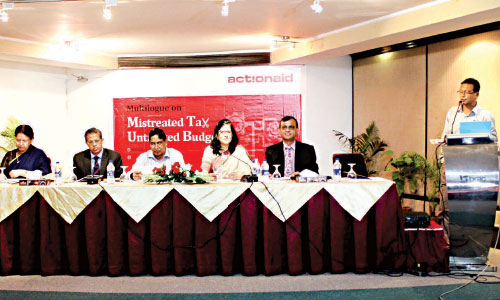Review double-taxation avoidance treaties to reap benefits
Experts at a dialogue on Saturday said the government should review the restrictive double-taxation avoidance treaties Bangladesh has signed with different countries as the country is losing its vital revenues due to the agreements which have also failed to attract the expected volume of foreign direct investment to the country.
At the dialogue ‘mistreated tax, untreated budget’, they said Bangladesh has already signed such agreements (DTAs) with 33 countries and of which 18 treaties are highly restrictive for the country in terms of collecting tax from multinational companies.
The country incurred revenue losses worth $85 million or Tk 700 in 2013 alone due to a single rule of the treaties related to tax on dividend.
The government should give emphasis on direct tax particularly corporate tax instead of indirect tax like value-added tax to lower the tax burden on common people, they said adding that the corporate tax still remained an untapped area within the tax structure in the country as the collection of corporate tax remained very low compared with that in rich countries.
Actionaid Bangladesh organised the dialogue at the BRAC Centre Inn in Dhaka to disseminate the Actionaid International’s report ‘Mistreated’.
National Board of Revenue former chairman Abdul Mazid said that the government should review the treaties (DTAs) to find whether the treaties fulfilled the targets of bringing FDI or how many of them (the treaties) caused revenue losses for the government.
He also said that the corporate income tax collection should be one of the major fields of the tax authority.
‘A lot of things need to be done to prevent tax evasion by multinational companies,’ he said.
Parliamentary standing committee on the finance ministry chairman Abdur Razzak said that VAT, as indirect tax, was not good and fair for common people.
Even the government in last year tried to increase the share of income tax collection to the total tax collection but failed, he said adding that the government must have to collect the highest portion of revenue from the direct tax sector.
He said that the country could not attract FDI despite giving tax break to MNCs due to other problems including inadequate infrastructure, shortage of gas and electricity.
Tax break is given to remain competitive with countries like Vietnam which gives such benefits to foreign investors, he said.
Business Initiative Leading Development chief executive officer Ferdaus Ara Begum said Bangladesh has DTAs with many countries but there is no investment from the MNCs of those countries in the country’s export processing zones.
There are scopes within the treaties to review those in line with the country’s interest, she said.
Citing an International Monetary Fund study, the Actionaid report said that the reliance of developing countries on corporate taxes accounts for about 16 per cent of their revenue compared with almost half in the developed world.
‘This gap implies that developing countries can tap the potential of raising revenue through collection of corporate taxes,’ it said.
The report said that the developing countries were mistreated through abuse of the important articles of treaties through imposing limitations on profit tax, withholding tax, dividends, interest, royalties and service fees and capital gains.
Bangladesh Securities and Exchange Commission commissioner Swapan Kumar Bala and Actionaid programme director Asgar Ali Sabri spoke, among others, at the programme which was moderated by Actionaid country director Farah Kabir.
News Courtesy: www.newagebd.net











